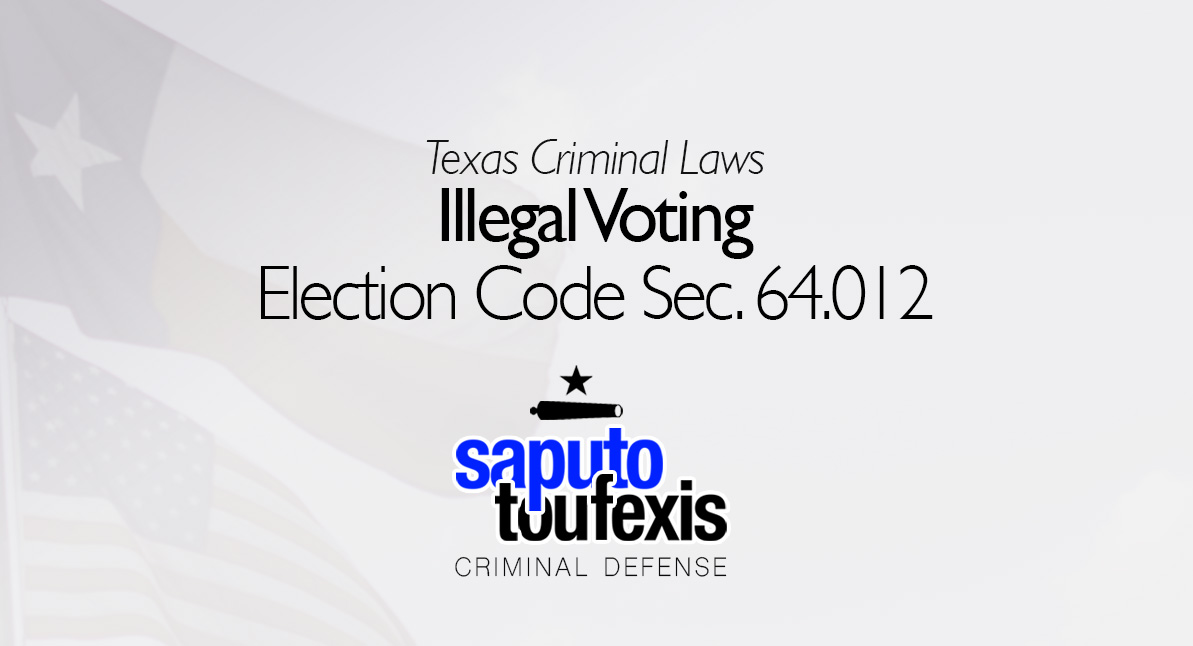The Texas Illegal Voting law gives police the right to arrest you if they believe you voted in one of the ways that is prohibited under the statute, including voting in an election in which the you know you’re not eligible to vote, voting more than once in an election, and voting a ballot belonging to another person.
FAQs about the
Illegal Voting law in Texas
- What is the current Texas law about Illegal Voting?
- What is the penalty for a Texas Illegal Voting offense?
- How can I be charged with an Illegal Voting offense in Texas?
- What is the statute of limitations for Illegal Voting in Texas?
- Can you get probation for Illegal Voting in Texas?
- What level of crime is Illegal Voting in Texas?
Including those first three examples, the statute lists five different ways of illegally voting, as described in detail below.
Have you been charged with Illegal Voting? Contact us today to discuss legal representation.
or Text or Call (888) 239-9305
The Texas legislature codified this criminal offense in Texas Election Code Section 64.012. The law was amended in 2017 and 2021. And the penalty level for this offense was raised to a felony in 2023 as a result of baseless politically-generated conspiracy theories about widespread illegal voting. The legislature did not amend this law in 2025.
This law is one of several voting-related offenses in Texas. The Texas Election Code provides two other voting offenses, including Engaging in Organized Election Fraud Activity (passed in 2017) and Unlawful Participation in Party Affairs (also passed in 2017). The Penal Code also provides a voting-related offense called Tampering with Direct Recording Electronic Voting Machine.
The Election Code classifies the Texas Illegal Voting law under Title 6 “Conduct of Elections,” Chapter 64 “Voting Procedures.” Learn more about the Texas offense of Illegal Voting below.
What is the current Texas law about Illegal Voting?
AV Preeminent Texas lawyer Paul Saputo provides the current law defining Illegal Voting in Election Code Section §64.012, as follows:[1]
(a) A person commits an offense if the person knowingly or intentionally:
(1) votes or attempts to vote in an election in which the person knows the person is not eligible to vote;
(2) votes or attempts to vote more than once in an election;
(3) votes or attempts to vote a ballot belonging to another person, or by impersonating another person;
(4) marks or attempts to mark any portion of another person’s ballot without the consent of that person, or without specific direction from that person how to mark the ballot; or
(5) votes or attempts to vote in an election in this state after voting in another state in an election in which a federal office appears on the ballot and the election day for both states is the same day.
The Court of Criminal Appeals delivered a ruling in 2022 that emphasized the necessity of a defendant’s knowledge of their ineligibility to vote for the purposes of subsection (a)(1) offenses.
In 2017, the legislature added the “without specific direction from that person how to mark the ballot” language in subdivision (4), which had the effect of allowing the state to obtain a conviction for someone who marked another person’s ballot with their consent if the other person did not issue the “specific direction.”[2]
In 2021, the legislature added subdivision (5) to the list above and added “knowingly or intentionally” to subsection (a), making those two applicable to each subdivision.[3]
The offense was enhanced to a felony by the 88th Texas Legislature in 2023,[4] effective September 1, 2023.[5]
What is the penalty for a Texas Illegal Voting offense?
Offenses that occurred prior to September 1, 2023, are classified as Class A misdemeanors.[6]
Amendments effective in 2023
After September 1, 2023, Illegal Voting in Texas is punished as a second degree felony, unless the offense was only “attempted” – in which case the offense level is a state jail felony.[7]
How can I be charged with an Illegal Voting offense in Texas?
You can be charged with Illegal Voting in Texas if the state’s attorneys believe that each of the elements of 64.012 as described in the section above have been met.
What is the statute of limitations for Illegal Voting in Texas?
Illegal Voting offenses have a three-year limitations period.[8]
Can you get probation for Illegal Voting in Texas?
The Texas Code of Criminal Procedure allows both judges and juries to grant probation for Illegal Voting, and judges are also allowed to accept deferred adjudication plea deals.[9]
Note, however, that no matter the offense, neither judges nor juries may recommend community supervision for any suspended sentence of over 10 years.[10] Also, judges may not grant community supervision after a conviction if (1) the defendant used or exhibited a deadly weapon during the commission of the felony or immediate flight thereafter and (2) the defendant used or exhibited the deadly weapon himself or was a party to the offense and knew that a deadly weapon would be used or exhibited.[11]
What level of crime is Illegal Voting in Texas?
The Election Code classifies Illegal Voting as either a state jail felony or second degree felony.
Learn more about the penalty range for this offense in the section above.
Legal References:
^1. Texas Election Code §64.012. This law is current as of 2025.^2. SB 5, 85th Texas Legislature (RS), Section 1^3. SB 1, 87th Texas Legislature (2), Section 9.03^4. HB 1243, 88th Texas Legislature (RS), Section 1^5. HB 1243, 88th Texas Legislature (RS), Section 3^6. See HB 1243, 88th Legislature, Section 1^7. Texas Elections Code §64.012(b), as amended by HB 1243, 88th Legislature, Section 1^8. See Code of Criminal Procedure §12.01(11)^9. See Chapter 42A, Texas Code of Criminal Procedure, Art. 42A.054, Art. 42A.056, Art. 42A.102^10. Art. 42A.053(c), Texas Code of Criminal Procedure^11. Art. 42A.054(b), Texas Code of Criminal Procedure










